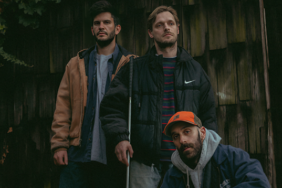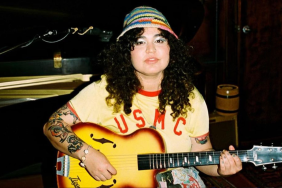No matter what medium Miel Bredouw has turned her focus on, she’s always known how to get a reaction. As an early adapter to Vine, she ended up as one of the platform’s most popular stars – not least of all for her seven-second masterpiece detailing an unfortunate rear-end condition. In the late 2010s, she entered the world of podcasting with Punch Up the Jam – a show that is equal parts a love letter and a Comedy Central roast of some of the biggest chart hits of all time. It too quickly rose in stature, including praise from Vulture and notable appearances at several comedy and podcast festivals.
What would happen, then, when Bredouw shifted her attention to the most vulnerable, emotive project of her entire career? Her debut solo album, Tourist Season, is sure to come as a surprise to fans of her previous work. Not in the sense of discovering her musical talents, mind you – anyone who’s listened to Punch Up the Jam is well aware of Bredouw’s musical background. Rather, Tourist Season surprises in the sense that it’s a quietly-devastating synth-pop record soundtracking the end of a relationship. Think the neon-tinged textures of acts like M83 and The Midnight with the visceral lyrical catharsis of records like Marvin Gaye’s ‘Here, My Dear’ or Bon Iver’s ‘For Emma, Forever Ago.’
Prior to the release of Tourist Season, Bredouw spoke openly and honestly – but of course – about the album’s creation, collaborating with her brother and the bittersweet joys of tearful piano chords.
Music Feeds: When Jon LaJoie released his first album of non-comedy music in 2016, he made a point of differentiating it and releasing it under a new project name, Wolfie’s Just Fine. You, however, have released the album simply under the mononym of Miel. Did you ever second-guess that decision yourself, or was it always a case of wanting to cut out the middle-man and explicitly putting yourself out there?
Miel Bredouw: I’m quick to call anyone a coward – most including myself. If this was a project where I was writing songs for the sake of the craft, perhaps I would be more inclined to differentiate them from my voice. These songs are super personal, though – I even tried to write the lyrics for the album with zero metaphor. I don’t know… maybe it’s my obsession with cowardice, but my reasoning is that if you’re gonna go for it, then fucking go for it, y’know?
MF: One can imagine that must have felt like the right call at the end of making the record – like there was no other way you could have gone about it.
MB: I guess we’ll really see when the album comes out. My guess is that I’m either going to feel really relieved or really stupid. [laughs] Guess we’ll see!
MF: You made Tourist Season in collaboration with your brother, Henri Bardot. Was there any degree of reticence or hesitation when it came to putting it all out there with him? As much as we bond with our siblings, when it comes down to it there’s still a lot we might not know about them.
MB: Oh god, yeah. I mean, when it comes to Henri… I don’t think “producer” even really does justice to what he did for this record. It doesn’t feel big enough. This was such a collaboration, even down to the emotional aspects. Obviously, this is my story and this album is the extent of my expression. The line between us got so blurred, though. He got so good at helping me through making this.
I actually just rediscovered this email – most of this album was created via email, in fact, despite us living in relatively close proximity. I think that aspect kind of enabled us to be so much more intimate with these really complex, heavy emotions. There was a lot of self-effacing on my part of some very dark sides of myself – in a perfect world, you don’t want your family finding that out. Henri really worked to make our creative environment a safe space.
So, in this email, we’re talking about potentially adding one more song to the album. We were basically seeing if there was anything left in the cannon. I send him back this email where I lay out every emotion that I’m feeling at this time. There was no lyricism or poetic nature of any kind. It was purely just the worst shit that I was thinking. Reading it back now, I just think, “How did this not send him spiralling immediately?” Even if not for concern for me – for any empathetic person to be reading stuff like that. We kept referencing Being John Malkovich – it was like, “here’s a wormhole into my brain. Have fun in there!” [laughs]
I really could not have asked for a better person to work on this record with. I’m so inspired by him, and I feel so lucky he wanted to do this with me. [pauses] Don’t tell him I said that. [laughs]
MF: You mentioned adding songs to the album briefly there. Tourist Season is seven tracks, which is seen as a somewhat unconventional number for an album – even in the classic ’70s format, there were at least eight songs on an LP. Was it a matter of saying everything that needed to be said within this set of songs?
MB: It’s so funny you bring this up. I’m not going to accuse you of wire-tapping, but it is suspicious. [laughs] Every song on this album is a different emotion or perspective on the failure of a relationship. It was really important to not reiterate anything. Heartbreak is simultaneously such a broad and specific subject. We didn’t want any two songs to effectively be from the same perspective. It doesn’t serve anybody. Every moment and vignette that these songs capture, they all speak to one another in a very specific way. We were adamant about laying out the tracklist for the same reason, so you could see how everything kind of came together and you could see the story being told.
Once the album took shape, it just came out of me like a fucking projectile vomit. Musically, emotionally, lyrically, the whole fucking thing. We let it move through us, and when it was over we had to pull our head out of the water and figure out where the fuck we were. These songs are like a little Brady Bunch family now. I can’t even think of picturing the album with one more or one less song. For me, I love a seven-song album anyway. As a listener, I don’t want any filler. I prefer a shorter record if it means every song serves a purpose.
MF: Obviously while Tourist Season was being written and created, you were working on Punch Up the Jam. Either explicitly or subtly, did the notion of picking apart songs piece by piece to analyse what you do and don’t like about them, impact what direction the songs themselves took?
MB: Honestly, I wish we were that thoughtful. Like I said, though, I really just puked this all out. I was really lucky with the timing of all of this – and I do wonder if this could have happened without it. When I was making this record last summer, Demi [Adejuyigbe, former Punch Up the Jam co-host] was still on the show. We’d finished taping, and we’d front-loaded about two months worth of episodes. The podcast was effectively on hiatus while I was making this record. I had no other commitments the entire month-and-a-half I was doing Tourist Season.
Perhaps, if I had been in that mindset of constantly analysing songs by isolating stems and paying too much attention, that may well have influenced what came out. This is a reach, but if Punch Up the Jam has affected my own songwriting in any way then it’s this: When you’re having to write something new every week and put it out publicly, it does force you to be less precious.
MF: Where did these songs start? Are you the kind of person who messes around on guitar or piano until you do something that catches your ear? Do you walk around humming a melody and then sing it into your phone? Can you only work in the immediate environment of the studio?
MB: The bulk of this record was a product of my brother and I sending stuff back and forth. I was messing around on an OP-1 [synthesizer] for a lot of the summer. I’d create a little arpeggio, maybe add a little melody sung in gibberish over the top of it, and send it over. I was up at the studio at my parents’ place, but I wasn’t about to figure out how to record an OP-1 into ProTools on my own. Instead, I’d just put everything into voice memos. Within about 24 hours, Henri would send something back with an actual ProTools track – either some amalgamation or similar thing as to what I’d sent him. He’d add in other suggestions, like “What about this?” That would set me off on my own thing, and I’d write back saying “are you hearing this?” with my own idea. It was just super collaborative.
There was one song I’m super proud of, which was the most pure collaboration I’ve ever had. When we first started, we cycled through the voice memos for song ideas to see if anything stuck. There was an idea that Henri had, and it didn’t really do anything for me – the instrumentation, the chord changes, the verse melody. There was this moment in the chorus, though, that I just found so perfect and so beautiful. I wanted to see if I could reverse engineer a song based around that part.
MF: What happened then?
MB: So, my parents’ barn – and I literally do mean a barn – has a little recording studio in it. Next to the studio is a futon. That’s basically where I lived – I’d go in there around 5pm and I’d stagger into my bed next door at around 5am. It was one of those nights where I was at the piano, trying to make something around this part. I was trying and trying and trying, and nothing fucking worked.
Then, something happened that I’ve never experienced in my life. I’ve heard plenty of these stories doing Punch Up the Jam, but I’ve never had it when writing one of my own songs. Out of nowhere, this chord progression came to me. This melody came to me. These lyrics came to me. Within 20 minutes, I’d written the rest of the song in its entirety. This is where it gets really cringey, though: I tried to play it through to send him on a voice memo, and I audibly break down crying at the end. I’ve never made myself cry writing a song before – I felt so akin to this [Taylor Swift song] ‘Teardrops On My Guitar’ moment. It was so embarrassing, even though I was by myself in a studio at 3am.
I send him this voice memo, not knowing if it’s any good or not. It’s like, “I have to share this – it was this moment of pure catharsis for me. Also, I got tears on the piano – please don’t tell dad.” [laughs] Henri writes back, and is like, “This is great!” We end up workshopping it, and that’s what makes it onto the album.
MF: Out of the seven songs, which do you feel was the lynchpin that set everything in motion insofar as what you and Henri wanted the record to sound and feel like?
MB: The truth is, we didn’t really know what it was going to sound like. We made it so fast, and so immersively, that by the time we knew the direction of the album it was already finished. We never really stopped to think about it – we couldn’t stop to think about it, even if we wanted it to. What I will say, though, is that there was a song that I think helped us to realise this was a project we needed to follow through on. We weren’t even committed to doing a record before we made ‘Mean Something.’
We produced it together – that was the only song that we made in the same space. It took us five days, which is a ridiculous amount of time to work on a single song. We honestly thought we’d get the bulk of a record done in five days! There were just so many late nights, and so many tweaks – we’d be tinkering, we’d be changing the structure, we’d be adding more stuff in. So much of that time was spent on stuff that never worked and was deleted immediately – but not before trying to make it work for five hours. [laughs]
We referred to it as “black diamond producing,” which I’ve since found out is a bad metaphor. Apparently, double black diamonds are even harder – but whatever. [laughs] When we finished producing that song, I think we were both kind of simultaneously impressed and confused. Neither of us had ever made anything that really sounded like that before. We weren’t even really thinking – we were just feeling and doing, like we were cavemen.
MF: It really feels as though this was made with absolutely no-one else in mind but yourselves – which is really such a liberating way to be creative.
MB: Everyone has been super positive about this record, which I feel especially surprised by considering this is probably the worst time in – oh, I don’t know – the last 50 years to be releasing an album. I got the weirdest DM the other day, though. It was like, “No matter what people say about your music, they will follow you blindly to the ends of the earth and consume any product you create. It doesn’t mean you’re good at it.” I was like… okay, cool. [laughs] If that were to be the general consensus, I suppose I would be a little crestfallen. Truthfully, though, I’ve been on the internet long enough to know if you make anything baring the audience response in mind, it can really destroy the creative process. In comedy, of course, you have to at least consider it – but if it’s more than, like, two per cent then it’s not healthy. You can’t let it get too close to the root.
MF: It’s good to know that the person who used to be known as “haemorrhoids girl” ultimately doesn’t care what people think.
MB: [laughs] Y’know, the greatest bit of advice that my father ever gave me was this saying: “What you think about me is none of my business.” Truthfully, being a person who’s been online and is now trying to be sincere online, I have really taken that advice to heart. Whatever happens with this album now is out of my hands – even if it only gets two streams, it doesn’t matter. It was something I had to do. It was something I had to make.
You remember how everyone was into that Marie Kondo book awhile back? The Art of Tidying Up? She talks about gifts in a chapter, and how they’re so hard to get rid of because of the sentimentality attached to them. They’re especially hard to get rid of if the person who gave them to you has died. She basically says that the purpose of a gift is over the second that you receive it. What happens to it after is pretty irrelevant. The whole point of it was that someone wanted to give something to you, and now they have. I found that so beautiful, and such a relief to read. That’s the way that I feel about Tourist Season. Once I’ve released it, my job is done here.
–
‘Tourist Season’ is out now. Catch Miel on Punch Up the Jam every Thursday via Headgum Podcasts.












